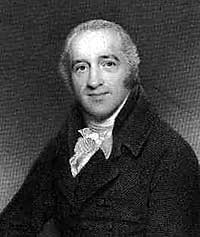Charles Simeon was known as the Prince of Evangelicals. Converted during his undergraduate years at Cambridge through reading the Book of Common Prayer's Holy Communion service, Simeonplayed a significant role in the late 18th, and early 19th centuries - in what David Bebbington describes as one of two great waves of evangelicalism.
Simeon was a thorough going evangelical of Calvinist persuasion. But Simeon was not factional;at a time when English evangelicals were divided over Calvinist and Arminian theologies, he had no time for those who lacked generosity and charitable in their dealings towards others outside their own tribe.. On the key doctrine of election from Romans 9 Simeon preached:
Many there are who cannot see these truths [the doctrines of God's sovereignty], who yet are in a state truly pleasing to God; yea many, at whose feet the best of us may be glad to be found in heaven. It is a great evil, when these doctrines are made a ground of separation one from another, and when the advocates of different systems anathematize each other... In reference to truths which are involved in so much obscurity as those which relate to the sovereignty of God mutual kindness and concession are far better than vehement argumentation and uncharitable discussion (Horae Homileticae, Vol. 15, 357).One example of this attitude at work in Simeon's life comes from a conversation between (the Calvinist) Simeon and an elderly (Arminian) John Wesley:
Sir, I understand that you are called an Arminian; and I have been sometimes called a Calvinist; and therefore I suppose we are to draw daggers. But before I consent to begin the combat, with your permission I will ask you a few questions. Pray, Sir, do you feel yourself a depraved creature, so depraved that you would never have thought of turning to God, if God had not first put it into your heart?
Yes, I do indeed.
And do you utterly despair of recommending yourself to God by anything you can do; and look for salvation solely through the blood and righteousness of Christ?
Yes, solely through Christ.
But, Sir, supposing you were at first saved by Christ, are you not somehow or other to save yourself afterwards by your own works?
No, I must be saved by Christ from first to last.
Allowing, then, that you were first turned by the grace of God, are you not in some way or other to keep yourself by your own power?
No.
What then, are you to be upheld every hour and every moment by God, as much as an infant in its mother's arms?
Yes, altogether.
And is all your hope in the grace and mercy of God to preserve you unto His heavenly kingdom?
Yes, I have no hope but in Him.
Then, Sir, with your leave I will put up my dagger again; for this is all my Calvinism; this is my election, my justification by faith, my final perseverance: it is in substance all that I hold, and as I hold it; and therefore, if you please, instead of searching out terms and phrases to be a ground of contention between us, we will cordially unite in those things wherein we agree. (H.C.G. Moule, Charles Simeon, London: InterVarsity, 1948, 79ff.)
May God raise up more men and women like Simeon who make every effort to maintain the unity of the Spirit in the bond of peace.




